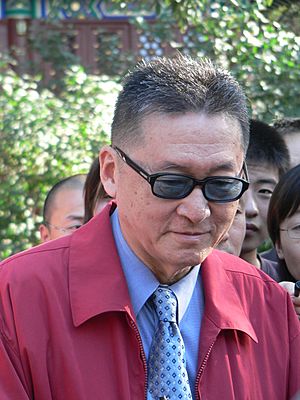Li Ao facts for kids
Quick facts for kids
Li Ao
|
|
|---|---|
|
李敖
|
|

Li Ao at Fayuan Temple in Beijing in 2005. The temple featured prominently in his first novel, Martyr's Shrine.
|
|
| Member of the Legislative Yuan | |
| In office 1 February 2005 – 31 January 2008 |
|
| Constituency | Taipei 2 |
| Personal details | |
| Born | 25 April 1935 Harbin, Manchukuo |
| Died | 18 March 2018 (aged 82) Taipei, Taiwan |
| Cause of death | Brain tumor |
| Spouses |
Terry Hu
(m. 1980; div. 1980)Wang Zhihui
(m. 1992) |
| Children | Hedy Lee [zh] (1964, daughter) Li Kan [zh] (1992, son) Li Chen (1994, daughter) |
| Parents | Li Dingyi Zhang Kuichen |
| Alma mater | National Taichung First Senior High School National Taiwan University |
| Occupation | Writer, social commentator, historian, independent politician |
| Known for | Civil rights movement, Activism, Chinese culture criticism |
| Courtesy name | Aozhi (敖之) (Pe̍h-ōe-jī: Ngô͘ Chi) |
Li Ao (Chinese: 李敖; pinyin: Lǐ Áo; Pe̍h-ōe-jī: Lí Ngô͘, also spelled Lee Ao; 25 April 1935 – 18 March 2018) was a famous Chinese writer, historian, and politician. He lived in Taiwan for most of his life.
Li Ao was known for speaking his mind. He often criticized the main political parties in Taiwan. These parties are the Kuomintang and the Democratic Progressive Party. Many of Li Ao's books were banned in Taiwan for a long time. He also spent time in jail because of his strong opinions.
Early Life and Education
Li Ao was born in Harbin, a city in Manchukuo, in 1935. His father, Li Dingyi, was a professor who taught Chinese. His mother was Zhang Kuichen. His family came from Shandong and Jilin provinces.
When Li Ao was two years old, his family moved to Beijing. Later, his father faced accusations from the Kuomintang party. This made Li Ao feel strongly against the party. At the end of the Chinese Civil War in 1949, his family moved to Taiwan. Li Ao earned his bachelor's degree in history from National Taiwan University in 1959.
A Voice for Change
Li Ao was an important part of Taiwan's movement for democracy from the 1960s to the 1980s. In the 1960s, he was the chief editor of a magazine called Wenxing. This magazine supported democracy and personal freedom.
Because of his beliefs and actions, Li Ao was put in jail by the Kuomintang government. He was imprisoned from 1971 to 1976. He also spent time in jail again from 1981 to 1982 due to a disagreement. His imprisonment gained international attention. Amnesty International even recognized him as a significant political prisoner in 1974.
After he was released, Li Ao kept writing articles. He continued to criticize the Kuomintang government. Ninety-six of his books were not allowed in Taiwan until 1991. In the 1980s, he also supported many magazines that were against the Kuomintang.
Li Ao wrote several novels. His book Mountaintop Love became very popular. Another important novel was Martyrs' Shrine, which tells the story of a reform movement in China. He also wrote his own life story in 2001. Most of his writings were non-fiction, including essays and historical comments.
Political Career
Li Ao decided to run for president in the year 2000. He was a candidate for the New Party. His campaign was mostly symbolic. He used it as a chance to "teach" the people of Taiwan about politics. He even told people to vote for another candidate, James Soong, instead of himself.
Later, in October 2004, Li Ao ran in the legislative election. He was elected as an independent legislator for South Taipei. He started his term on February 1, 2005.
In February 2005, Li Ao held a press conference. He accused a political leader of changing his mind about buying weapons from the United States. Li Ao claimed this was due to the influence of certain people. He threatened to reveal names if the leader did not change his stance.
On September 19, 2005, Li Ao visited Mainland China. It was his first time back in 56 years. He gave speeches at famous universities like Peking University and Tsinghua University. His trip was seen as important for relations between Taiwan and Mainland China.
Li Ao also ran for mayor of Taipei in 2006. He later ran for the Legislative Yuan again in 2012. He was known for his strong and sometimes unusual ways of expressing his political views. For example, in 2006, he strongly protested a bill about buying weapons from the U.S. during a meeting.
Family Life
Li Ao was married twice. On May 6, 1980, he married Terry Hu, a Taiwanese writer and actress. They divorced a few months later, on August 28, 1980.
On March 8, 1992, Li Ao married his second wife, Wang Zhihui. They had a son and a daughter together. Their son, Li Kan, studied at Peking University and is now a PhD student at University of Cambridge. Li Ao also had an older daughter, Hedy W. Lee, from a previous relationship.
Li Ao passed away on March 18, 2018, in Taipei, Taiwan. He died from a brain tumor.
 | Leon Lynch |
 | Milton P. Webster |
 | Ferdinand Smith |

